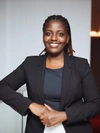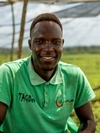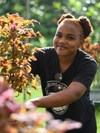Vanessa Ishimwe
Building Pathways for Refugee Women and Girls

When Vanessa Ishimwe reflects on her work, she doesn’t begin with the projects she’s managing today. She starts with the girl she once was – a refugee navigating an uncertain path, yet determined to stay in school and keep her dreams alive.
“Refugee women and girls face so many barriers. I lived it. And that’s why I want to change it.”
Vanessa was displaced from Rwanda to Uganda with her family as a child. That experience shaped her adult life, fueling a belief that young women like herself could not only survive displacement but thrive and create opportunities for others.

Vanessa founded her first venture in 2019. It was small but significant: Authentic African Works not only created leather goods but also employed refugee women as artisans. For women who had long struggled to earn a steady income, the business provided both dignity and cash flow.
But more than the financials, Vanessa discovered something else: the sense of agency that comes when women earn for themselves. “The money was important,” she recalls, “but what mattered even more was the confidence women started to feel from being able to support their families.”
Running the business also revealed the structural challenges refugee women entrepreneurs faced. Access to finance was limited, networks were small, and opportunities to scale were rare.
Vanessa realized that to make a deeper impact, she needed to look beyond individual transactions. She needed to address the ecosystem.

That realization led Vanessa in 2022 to expand Authentic African Works into what is now Fuse Women Initiative, a refugee women-led organization dedicated to strengthening opportunities for refugee women and girls.
Her vision was ambitious: not only to support a handful of women but to open pathways many could travel. Fuse works on three fronts:
- Education for girls – keeping them in secondary school through scholarships.
- Market linkages for women – connecting refugee women entrepreneurs with markets and opportunities.
- Capacity strengthening and advocacy – building the strength, efficiency, and community of refugee women–led organizations.
Fuse has brought the different strands of their work together. They are still running a profitable leather goods enterprise while supporting 15 girls with secondary school scholarships. They have connected dozens of refugee women entrepreneurs to market opportunities, helping them turn small businesses into viable livelihoods. They also support other refugee women leaders. In August 2025, Fuse convened 35 refugee women-led organizations and helped to build their capacity, raise their visibility and trust, and secure more funding for their organizations.
Some of the income generated through her businesses is reinvested directly into these efforts. “We don’t wait for outside donors to tell us it’s important. We invest our own money. For them, it may be a KPI. For us, it’s a fight for our lives.”
The work is rewarding, but not without its challenges. Vanessa speaks about the isolation and pressure that comes with being a young refugee leader.
You carry the weight of so many expectations”, she says, “and sometimes, as a refugee, doors close before you even knock.”
Accessing resources for refugee-led organizations is a constant challenge. Even when funding is available, the requirements can often exclude grassroots groups like Fuse. Still, Vanessa has learned to persist, adapt, and continue telling the story of why refugee women and girls matter.
Support has come in different forms. In 2019, Vanessa won the Anzisha Prize, a fellowship program that backs young African entrepreneurs. The experience exposed her to networks, mentorship, and new ways of thinking about enterprise and leadership.

“It taught me that my story matters,” she says. “Sometimes we forget that people need to hear directly from refugee women leaders. Anzisha helped me see the power of my voice.”
This recognition helped raise the profile of the Fuse Women Initiative and opened doors to partnerships that were once out of reach.
Vanessa is also a member of Mastercard Foundation’s RDP Youth Advisory Committee.
Vanessa Ishimwe is clear about where she wants to go next. She dreams of building a profitable and sustainable business to support girls to complete their education and link thousands of women to dignified livelihoods. But her vision stretches further.
“In twenty years, I want to see refugee women–led organizations everywhere, fully funded, fully trusted, shaping policies and changing systems. I want us to be decision-makers, not just beneficiaries.”
Asked what advice she would give to other young people facing barriers, Vanessa says:
“It’s never going to be easy in the beginning if you want to start a business. You’re not going to wake up in the morning and start making millions. It’s about persistence, learning and continuous growth. So start now, start young, start scared. You will get there eventually.”

Learn more about Refugee Led Organizartions
Meet the Duo Championing Women-Led RLOs. Vanessa Ishimwe and Deline Ramiro know exactly what it's like to be a refugee woman in leadership.






